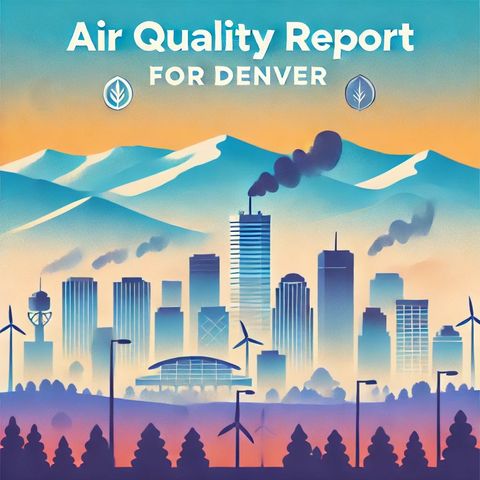Denver's Air Quality a Growing Concern Amid Urban Challenges

Download and listen anywhere
Download your favorite episodes and enjoy them, wherever you are! Sign up or log in now to access offline listening.
Denver's Air Quality a Growing Concern Amid Urban Challenges
This is an automatically generated transcript. Please note that complete accuracy is not guaranteed.
Description
As of today, Denver's air quality is a concern that reflects both immediate environmental conditions and broader challenges associated with urban air pollution. Denver's topography, coupled with its growing urban...
show moreToday, the Air Quality Index, or AQI, for Denver is in a moderately concerning range. The AQI system, which ranges from 0 to 500, helps provide a gauge for air pollution levels and their potential health impacts. In the case of Denver, the primary pollutants affecting air quality today include particulate matter (PM2.5 and PM10) and ground-level ozone.
Particulate matter, particularly PM2.5, consists of tiny particles or droplets in the air that can be harmful when inhaled. These particles are often the result of various factors, including vehicular emissions, industrial activities, and even wildfires, which are not uncommon in the region. On days when particulate matter levels are high, residents may experience symptoms such as throat irritation and difficulty breathing, and those with pre-existing respiratory conditions are particularly at risk.
Ground-level ozone, another significant pollutant today, forms when pollutants emitted by cars, power plants, and other sources react in the presence of sunlight. High ozone levels can lead to respiratory issues and are particularly dangerous for children, the elderly, and individuals with asthma or other respiratory conditions. On especially sunny, warm days, ozone levels can spike, exacerbating the issue.
Weather patterns play a crucial role in determining air quality. Denver's geographical location and altitude can sometimes cause temperature inversions, where a layer of warm air traps cooler air at the surface. This prevents pollutants from dispersing and can lead to the accumulation of smog over the city. In such instances, air quality advisories are often issued, urging sensitive groups to limit outdoor activities.
Efforts are underway to address Denver's air quality challenges. Local and state governments are working in tandem with community organizations to implement strategies aimed at reducing emissions. This includes promoting public transportation, encouraging the use of electric vehicles, and enhancing industrial regulations. Additionally, public awareness campaigns seek to educate residents about how they can contribute to improving air quality, such as reducing idling times for vehicles and utilizing energy-efficient practices at home.
In conclusion, while today's air quality in Denver presents certain health challenges, ongoing efforts and heightened awareness aim to mitigate the effects of pollution. With continued focus on sustainable practices and policy implementation, there is hope for a cleaner, healthier environment for all Denver residents.
Information
| Author | QP-5 |
| Organization | William Corbin |
| Website | - |
| Tags |
Copyright 2024 - Spreaker Inc. an iHeartMedia Company
